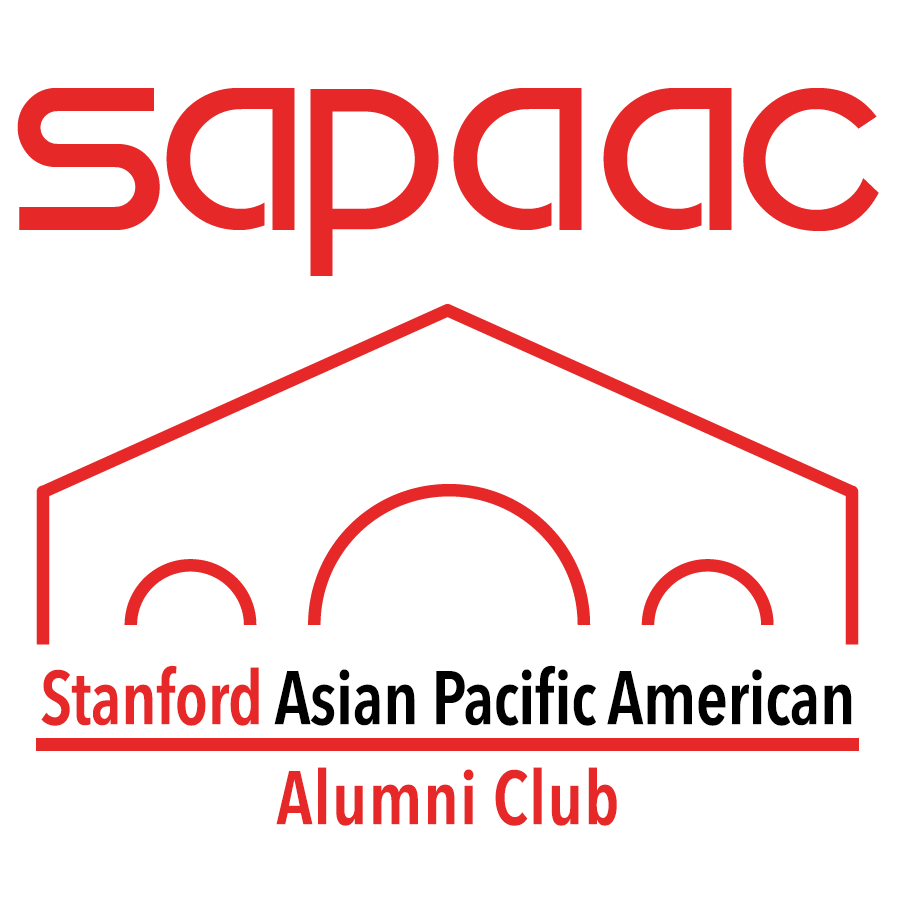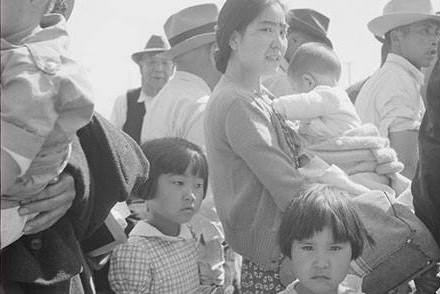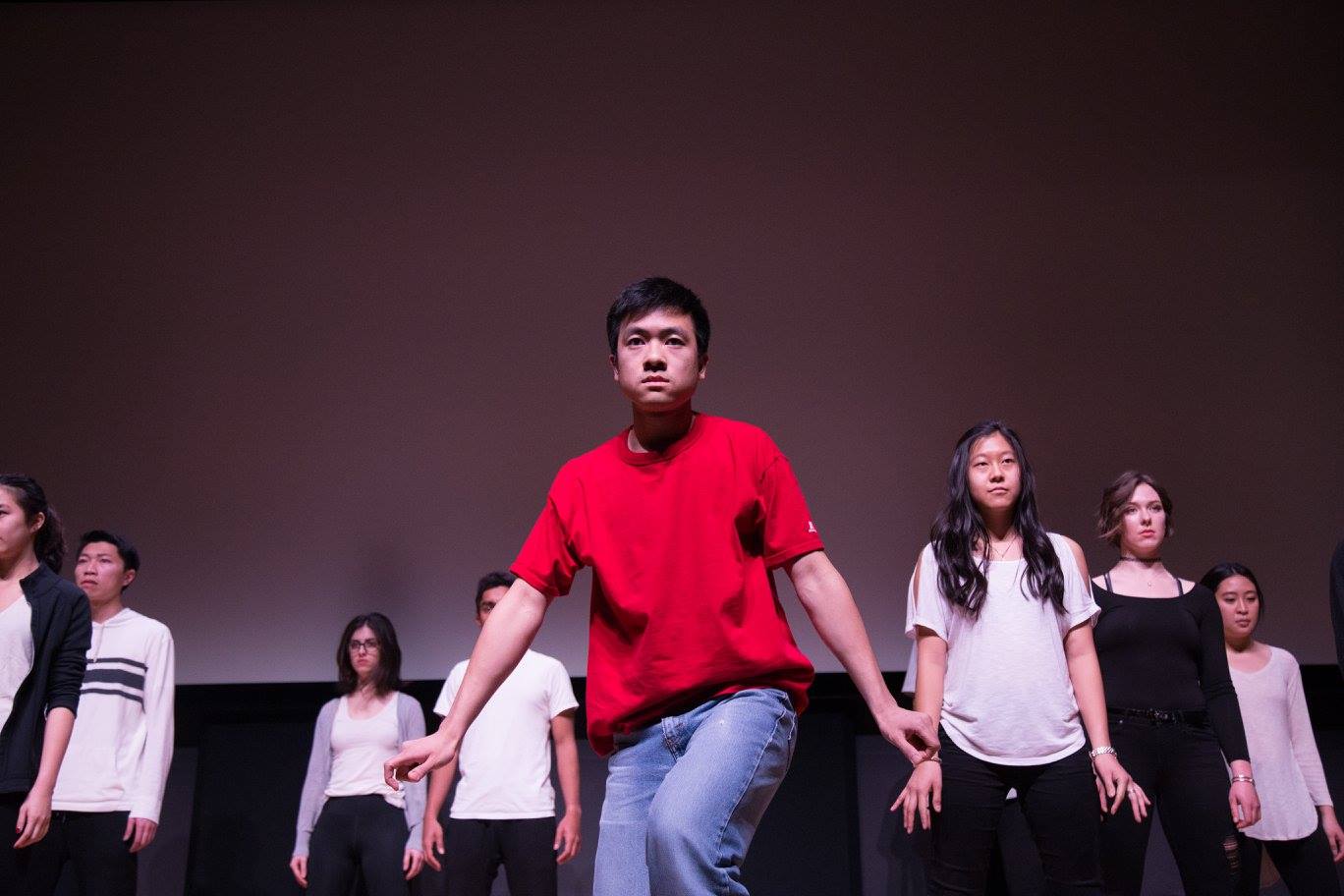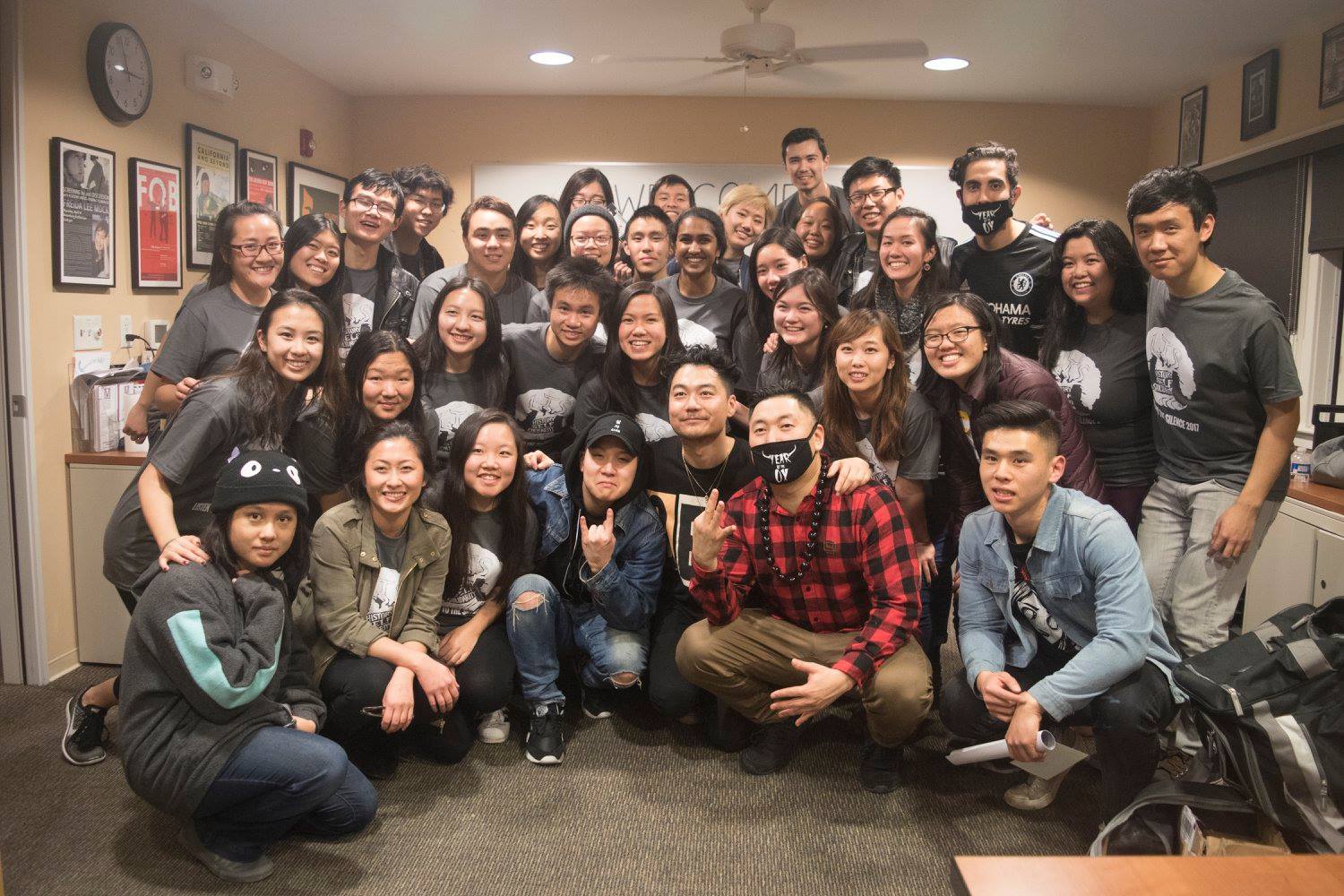Tune in to issues around the nation and get the scoop on Stanford activism! This monthly publication produced by the SAPAAC Issues & Advocacy committee highlights the latest developments in politics, current events, culture and entertainment of interest to the Asian American & Pacific Islander community. It includes specific actions you can do to be an advocate.
Articles from February 1-28 are included in this edition.
"Three Boys Behind Barbed Wire" 1942-45 by Toyo Miyatake. Source: UC Riverside
I. POLITICAL ORGANIZING
As columnist Ryan Ko reminds us, “Democracy is not a spectator sport.” He has crafted a handy guide with easy, medium, and full-contact ways of getting involved. Here are a few other examples that are happening around the Bay Area.
Indivisible action group at UCSF: Alli Wong and Christina Fitzsimmons lead a group in San Francisco focused on turning the Indivisible Guide into action in their local community. The Guide is a document produced by former Congressional staffers to train everyday citizens to effectively impact Congress, stating “We believe that protecting our values, our neighbors, and ourselves will require mounting … resistance built on the values of inclusion, tolerance, and fairness.”
According to Wong, “Our group is based at UCSF. We have in-person meetings to strategize and take action together, but many others follow along online and take action, such as calling their representatives, as well. Since many of us are researchers and scientists, the group is loosely centered around science policy, but it is open to all.” No UCSF-affiliation required, just a commitment to democracy.
Their next action is to join a town hall with Senator Dianne Feinstein. Join Alli, Christina and the Indivisible SF group by visiting this link. Or start up your own Indivisible group!
Save Federal Climate Data: Scientists and engineers with knowledge of computer science and/or an interest in the environment are gathering for hackathons to save climate data, and other scientific knowledge many research use, before the Trump administration erases it. Events have taken place in UC Berkeley, UCLA, University of Toronto and elsewhere. Regular citizens can participate: find out more here.
Mass Demonstrations this Spring (Day Without Women, Day Without Immigrants, March for Science & More): “Organizers across the US are riding the momentum of the post-inauguration march to mobilize in solidarity with scientists, immigrants, LGBT people” among others. Find out more here.
One example is the “Day Without Immigrants” protest to peacefully demonstrate how immigrants contribute to our economy. Another is the women’s strike on March 8, “A Day Without a Woman” where “women, including trans women, and all who support them” will take part in an “international day of struggle...striking, marching, blocking roads, bridges, and squares, abstaining from domestic, care and sex work, boycotting, calling out misogynistic politicians and companies, striking in educational institutions.” Groups in over 30 countries will participate. Find out more.
Support Racial Justice Movements: In the Bay Area, the SURJ Showing Up for Racial Justice is organizing a “Human Billboard” to aid Black Lives Matter.
Call your Representatives: “You can tweet into the void all you want” developer Nick O’Neill told Wired magazine, “but there’s something about just connecting with a human being who says, ‘Thank you for contacting us.'” O’Neill co-created an online tool called “5 Calls” that “helps people find their representatives’ phone numbers and speak out on important issues” and “provides a script designed to make the process easier for both callers and the staffers on the other side. It tells you what to mention, and in what order. It also reminds you, for example, to leave your address in a voicemail or else you won’t be counted as a constituent.”
For example, the Senate Committee on Homeland Security is counting calls before it decides whether to approve Steve Bannon's appointment to the National Security Council. The number is: 202-224-4751. If you disagree with Bannon’s appointment, you can call (no one will answer) and leave a message saying “Don't approve Steve Bannon's appointment to the NSC.” Or conversely, supporting his appointment if that is your political inclination.
Unfortunately, “millennials across the rich world are failing to vote” as The Economist reports. “Democracies are at risk if young people continue to shun the ballot box” yet “Millennials do not see voting as a duty.” Please don’t be one of them.
Befriend an International Student: Quartz reveals that “40% of foreign students in the US have no close friends on campus” calling it “the culture shock of loneliness.” A simple but meaningful gesture is to befriend one of them. Chinese students at Columbia University in New York took things a step further when “Earlier this month, a number of students with East Asian names reported having their name tags ripped off their doors in multiple residence halls on campus. In response, the students got together and produced a video talking about the stories behind their names, trying to stem the rising tide of racism, xenophobia and prejudice in the US.”
Get informed: No matter your political viewpoint, it is important to stay informed & to voice your opinion to your representatives. One SAPAAC alumni recommends two tools that make it easy to do both:
(1) Download "Countable" from the App Store to learn about proposed bills and orders from the federal government
(2) Text your zip code to 1-520-200-2223 and you'll get a return text with the names & telephone numbers of your federal and state representatives
II. NATIONAL AAPI VOICES
Resigning from Trump’s Advisory Council: Ten members of the President's Advisory Commission on Asian Americans and Pacific Islanders (AAPIs) submitted their resignation to President Donald Trump. SAPAAC member and Stanford alumnus Kathy Ko Chin was one of the commissioners who resigned.
According to NBC News: "The choice to stay on under the new administration was with the hopes that I would have a seat at the table to be able to bring up the issues that are important to our community based on the work that's happened over many years under this commission...It became very clear to me in the last month and a half that that voice at the table wasn't going to be able to be effective inside the administration the way that I hoped it would be,” said Maulik Pancholy. Read their letter here.
Chair of the Commission and UCSF professor Tung Thanh Nguyen said that the Trump administration's activities over the last month “have threatened the progress made by former President Barack Obama for AAPI communities,” which had previously “generated an unprecedented amount of connection" between AAPIs and the federal government.
The First-Ever Tracker of Hate Crimes Against Asian-Americans is Launched: As reported by NPR, “After years of declining numbers, hate crimes against Asian Americans and Pacific Islanders are rising.”
III. IMMIGRATION BAN & ASIAN AMERICANS
Fighting back against the Trump Administration’s Immigration Ban: Groups are filing lawsuits against the order claiming it commits religious discrimination. “The American Civil Liberties Union, in challenging the order, described it as a ‘Muslim ban wrapped in paper-thin national security rationale.’ Dan Siciliano, a law professor at Stanford, says it was ‘clearly a nationality ban and a de facto religion ban.’" (Bloomberg)
As an example of the impact of the ban and related political rhetoric, “US-born NASA scientist Sidd Bikkannavar was detained at the border until he unlocked his phone.” In a worrisome move, Trump has also suggested conducting social media checks on Chinese visitors.
Stanford University joins amicus brief opposing travel ban: A group of 17 American universities, including Stanford, has filed a court brief outlining the harm to the academic community from the Jan. 27 executive order. Read the amicus brief here.
A Stanford student and the ACLU sue Trump over immigration ban: "Hadil Al-Mowafak, a freshman studying at Stanford with an F-1 student visa, joined a UC Berkeley Ph.D. candidate and a San Diego college student in filing the lawsuit Thursday through the ACLU." They are "suing President Donald Trump for ordering what they say is an unconstitutional immigration ban against seven Muslim-majority countries ... Al-Mowafak alleges that she is unable to visit her husband in Yemen because of an executive order Trump signed Jan. 27 ... The California students’ lawsuit, and similar lawsuits filed across the country, say that Trump’s order is an 'unlawful attempt to discriminate against Muslims and to establish a preference for one religion over another.'" (San Jose Mercury News, Stanford Daily, Palo Alto Weekly)
The Stanford Faculty Senate weighs in on the issue here. Stanford University President Marc Tessier-Lavigne rejected a student-initiated Stanford “Sanctuary Campus” proposal, but affirms “shared values.” Find out more details about Stanford’s response to immigration issues in SAPAAC’s previous coverage.
Immigration Ban & Chinese Exclusion
Chinese American Exclusion: In “A Chinese American Lesson for Trump,” Al Jazeera highlights how the “Muslim ban” is actually a new iteration of an old problem. Chinese Americans faced “decades of discrimination” under the Chinese Exclusion Act. Lest we forget, “Before It Embraced Immigrants, California Championed the Chinese Exclusion Act of 1882” (KCET)
Find out more on Chinese immigrants and their experience coming through Angel Island with the Angel Island Photo Gallery and a new book called”Island: Poetry and History of Chinese Immigrants on Angel Island, 1910-1940” Politics of Chinese Immigration on Angel Island by Judy Yung, professor emerita of American Studies at UC Santa Cruz. The book was coauthored with the late Him Mark Lai and Genny Lim, a native San Francisco poet, playwright, performer, and educator.
IV. Japanese American Internment: 75 Years Later
Source: Seattle Public Library
As xenophobic comments and policies spread, it is crucial to look at America's history and learn from our past mistakes and human rights violations.
Day of Remembrance: February 19 marks the 75th anniversary of Executive Order 9066, when President Franklin Roosevelt ordered the internment of 120,000 Japanese Americans during World War II. Governor Jay Inslee of Washington state reminds us to remember.
George Takei, an American actor of Japanese descent, was five when this happened, and his family was put in one of the prison camps. “Almost overnight, because Pearl Harbor was bombed by people that looked like us, Japanese Americans were seen as enemies...The politicians got swept up in war hysteria and the President’s order put us into the barbed wire prison camps. We were Americans, but it didn’t matter.” Takei has been vocal in opposing the modern incarnation of these actions and produced a show called “Allegiance” that takes on the difficult, historical subject matter. History.com also has a detailed Q&A with Takei.
On the Day of Remembrance, find out much more about the Japanese internment through historical documents from the U.S. archives. Read the text of Order 9066 itself here. If you are in Los Angeles, you can currently see the document on display at the Japanese American National Museum. Read other commentary on this act that imprisoned our fellow Americans, causing personal hardships and massive economic losses among the Japanese American community.
“75 years later, Japanese Americans recall” the “pain of internment camps,” Reuters reports. The Washington Post has produced an excellent graphical interface that explores this pivotal historic event. The out-of-print Amerasia Journal 19:1 “Commemorative Issue on Japanese American Internment Fiftieth Anniversary“ is available for free via their online journal portal, with articles by scholars such as Don T. Nakanishi, Stanford’s own Gordon Chang, and Hisaye Yamamoto DeSoto, “as well as reflections from UCLA professors on incorporating the camps into curriculum.”
V. OTHER STANFORD ACTIVISM
Listen to the Silence conference at Stanford: Asian American Student Association hosted “Listen to the Silence,” a major conference for undergraduate Asian American activists from numerous universities. Programming included an affirmative action workshop discussing class disparity, underrepresented groups within the AAPI community, and those beyond the diaspora. An “activist tour” of Stanford campus explored the injustices, controversies, and community victories in Stanford's past and present, inspiring participants to learn from the struggles of previous and current generations of activists.
Here is a report from two organizers, Stanford students Vy Luu and Mai Ka Vang:
On January 28, 2017, the Asian American Students’ Association hosted the 21st annual Listen to the Silence (LTS) conference. The conference was founded in 1995 to educate the Stanford community and beyond about issues affecting the Asian American community. Since then, the conference goals have expanded to include the empowerment of Asian American students to take direct action to improve their communities and work towards social justice.
This year’s conference theme was titled “Know History, Know Self, Know Solidarity," which focused on exploring the political roots of the Asian American identity in order to advance a vision of justice that emphasizes the Asian American community’s intricate ties to other communities of color. Over 400 participants—high school students, undergraduate and graduate students, community members—attended this year’s LTS. Participants came from all over California, from San Diego to Fresno. The day began with a panel of activists involved with the Asian American movement in the 1960s who spoke about the origins of the Asian American identity. Later on in the day, the keynote speaker Gregory Cendana spoke about his contemporary work in organizing Asian Americans and Pacific Islanders to work towards justice for their communities and beyond.
Throughout the day, participants attended workshops hosted by various Stanford student organizations and community organizations to learn about issues such as anti-blackness and gender in the Asian American community.
If you are interested in learning more about LTS or being involved in the future, please email StanfordLTSTeam@gmail.com. You can also see more photos at the event Facebook page.
Editor's note: Some of the speakers included Stanford history professor Gordon Chang; Harvey Dong, a UC Berkeley lecturer in ethnic studies and owner of Eastwind Books; Estella Habal, emeritus professor of Asian American Studies at San Jose State and former organizer for the International Hotel Tenants Association; and Karen Ishizuka, film producer, museum curator, and author of the recently-published book “Serve the People: Making Asian America in the Long Sixties.”
Stanford fires lawyer who advocated for sexual assault victims: In a decidedly less progressive move, Stanford has fired the lawyer who advocated for assault victims at the university and advised on Title IX issue. The ASSU Senate (student body) condemned this action.
VI. Asian Americans: Access to Equality
Asian last names lead to fewer job interviews: NPR reports on a study “that found that job applicants with Asian names were 28% less likely to get called for an interview compared to applicants with Anglo names, even when all the qualifications were the same.” Asian applicants may feel “pressure to “whiten” resume so you can double chance to receive call back.”
Exploding the myth of "Asian American Success: At the same time, “When politicians talk about race and diversity in America, Asian-Americans are noticeably absent from the conversation. Their portrait is one dimensional: wealthy, educated, successful.” But as New York magazine reports, in “The Myth of Asian American Success And How Invisibility Becomes Institutionalized,” if you look “more closely at the numbers, you see a different picture altogether.”
For example, one out of every 7 Asian immigrants is undocumented (AAPI Data) “Asian undocumented immigrants account for about 14% of the total undocumented population in the United States.”
“As a Chinese-American alumnus who interviews applicants to Yale, I’m often asked one question by Asian-American students and parents: “Will being Asian hurt my chances?” Andrew Lam writes in The New York Times that the problem with admissions isn’t other minority students from Black and Latino communities, but “White Students’ Unfair Advantage in Admissions."
VII. Asian Americans: Culture & Representation
Constance Wu has been outspoken on issues of Asian American identity and representation in television and films. (Image source: Time)
The price of “cheap” Asian food: Diep Tran, chef and owner of Good Girl Dinette, a Vietnamese comfort food restaurant, writes an op-ed in NPR about the costs of “cheap” human labor when we demand “cheap” Asian food and asks for “deep compassion for and understanding of the pressures facing immigrant restaurateurs.”
In other culinary news, MissBish features Korean American adoptee and Top Chef winner Kristen Kish.
Hollywood: According to The Hollywood Reporter, Constance Wu of “Fresh Off the Boat” fame will star in “Crazy, Rich Asians,” a new feature film. Speaking of Hollywood media, Janice Min, the top editor at The Hollywood Reporter, will soon step down. Her seven year tenure led the publication to a “stunning turnaround.” Vanessa Hudgens, who stars in NBC’s Powerless, made her character half-Filipino which reflects her real-life heritage. (AsAmNews)
Print: The Los Altos Stage Company presented “Yellow Face” by Stanford alum Henry David Hwang. Celebrated writer Bharati Mukherjee, author of "The Middleman and Other Stories" and "Jasmine" died on January 28 at the age of 76. “The Middleman and Other Stories” won a National Book Critics Circle Award in 1988. According to NBC, Mukherjee’s “writing and research interests included immigration, American culture, multiculturalism, nationhood, alienation, and the struggles of Indian women.”
Outrageous editorial: Vogue magazine’s “diversity” issue featured a supermodel in a Japanese-themed spread, titled “Spirited Away” and exoticizing her as a geisha. Angry Asian Man explains (again) why “Yellow face is a really awful way to celebrate ‘diversity’”
Transgender rights: In contrast, Teen Vogue has done a far superior job than its parent magazine in covering politics in a sensitive, thoughtful and informed way, for example throwing light on the Trump administration’s withdrawal of protections for transgender people.
AAPI transgender activist Janet Mock, whose father is African American and mother is native Hawaiian, suggests in a New York Times op-ed that “Young People Get Trans Rights. It’s Adults Who Don’t.” Read her letter to transgender students in the aftermath of the Trump administration’s hostility to transgender people.
Tragedy: A 60-year old Asian grandfather was shot while playing Pokemon Go.
Legal Profession: Asian Americans Advancing Justice (AAJC) announced the selection of “nationally recognized attorney John C. Yang” as the new president and executive director of the organization. According to AAJC, Yang’s service includes terms as President, National Asian Pacific American Bar Association (2003–04); Board Chair, AAJC (2005–08); and Board Member, American Bar Association Commission on Racial & Ethnic Diversity in the Legal Profession (2009–12). He was co-founder of the Asian Pacific American Legal Center (1997).
Read a hilarious feature on how, “This Kiwifruit Isn't From New Zealand at All. It's Chinese, and This Is How It Got Hijacked.” The kiwi “may be New Zealand's defining agricultural product, generating $1.05 billion in exports for the country in 2015. However, the fruit (Latin name Actinidia deliciosa) was originally known as the Chinese gooseberry.” Here’s the story of how it lost its Chinese roots through Western marketing.







